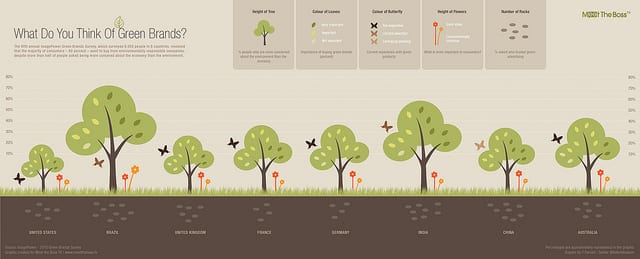We’ve been talking this month about the relationship that millennials have (or don’t have) with consumerism. During our exploration, you’ve certainly heard us use the term “ethical consumer” a number of times. We’ve even touched lightly on what it means, but it’s such an essential cousin to the concepts of the millennial consumer, anticonsumer or postconsumer that we’re devoting an entire article to it. Chances are, many of you were an ethical consumer long before the term got coined. But because the phrase is both a good elevation of consumer ideals for millennials and a pathway to marketing traps, we think it requires further exploration all on its own.
Ethical Consumer: The Definition
Of course, for this we turn to Wikipedia, which defines the term thusly: “Ethical consumerism (alternatively called ethical consumption, ethical purchasing, moral purchasing, ethical sourcing, ethical shopping or green consumerism) is a type of consumer activism that is based on the concept of dollar voting. It is practiced through ‘positive buying’ in that ethical products are favored, or ‘moral boycott’, that is negative purchasing and company-based purchasing.”
In short (because let’s be honest – that is an in-depth explanation), an ethical consumer buys things but with the greater good in mind. So, you’re not likely to see an ethical consumer hitting up your local big box store and buying garments that were made while releasing harsh chemicals into the environment and that were created by developing-world underprivileged kids. You’re much more likely to see an ethical consumer shopping locally and using the Buycott app to ensure that the companies and brands that he or she favors support the causes that are important to the person. From a postconsumer perspective, an ethical consumer is more likely to be thoughtful about purchases and less likely to fall into some of the traps of associating identity with “stuff.” Of course, there are other traps to fall into.
The Upsides of Ethical Consumers: Always the Optimists
We think that most of our readers are smart enough to know all of the upsides of ethical consumerism. After all, many of the same things that are wrapped into ethical consumerism are things that Postconsumers advocates for again and again. Be thoughtful about the purchases that you make. Don’t just blindly buy things on a whim. Understand the environmental and social impact of “stuff” and where it comes from. These are all good things. We would take a world full of ethical consumers and be joyful about it. We just think that you’d still have a world where people were coming in short of full satisfaction, and the next paragraph explains our reason for thinking that.
Don’t Be Fooled: Ethical Consumers DO Associate Identity with “Stuff.”
Just because you’re not associating your identity with stuff with a fancy brand label on it, it doesn’t mean that you’re not creating identity through what you buy. Are ethical consumers doing that? Absolutely. They want you to see what they buy and to know that they made a choice that was “better” than big box store. We’re going to bypass the inevitable socioeconomic discussion that should follow that statement, and we also want to make clear that we’re not judging ethical consumers (or for that matter millennials) when we make that statement. But it is important in the discussion of consumerism to always be truthful. Just because a group of people is identifying themselves in relation to what they buy in a way that is more in line with our own beliefs, it doesn’t make it any less concerning – or less unhealthy –that they’re doing it. We understand how it happens – the consumer machine is deeply ingrained in our culture. But we all need to be wary that we’re not enabling or rewarding addictive consumerism just because it’s a more palatable form of addictive consumerism for us.
And Don’t Be Fooled a Second Time – Marketers Are Actively Appealing to Ethical Consumers
If you read our earlier piece on millennials and marketing (and no pressure if you didn’t), then you would have read how marketers are specifically using a technique called “cause marketing” to appeal to ethical consumer millennials. Is this good or bad? That’s a fine line, truly. Cause marketing is good in that in many cases it does improve ethical practices such as labor policies of companies and it does create more environmentally friendly practices. This truly is evidence that we vote with our dollars and companies will respond to it. However, as with any discussion about marketing and consumerism, there’s also a downside. It’s still a marketing tactic. It still does all of the things that marketing tactics do, including convincing people to create an identity related to “stuff” and to buy things that they don’t need. So while we may applaud the fact that ethical consumers are improving the world, what we really need to drive towards is more than ethics.
In the same earlier piece we referenced about marketing and millennials, we mentioned that research shows that millennials feel more personally connected to the brands that they support. That’s certainly a danger zone. Brands are things. They may be things that can craft a great cause marketing campaign, but they’re still not things that anybody should feel a personal relationship with. Things can’t have a relationship.
The Verdict
Ethical consumerism is certainly a better brand of consumerism than the “Keeping Up with the Joneses” and the “Buy More, More, More” brand that’s been so prevalent in the last several decades. But that doesn’t mean that it isn’t a form of consumerism to be wary of. The message is still one of feeling good about yourself and crafting identity through “stuff.” We’re staying optimistic though and believing that the current millennial generation will see through it!
Did we miss an important point in explaining what an ethical consumer is? Tell us about it on the social media channels below.
Facebook | Twitter | Instagram | Tumblr | Pinterest | Google+ | Medium
Photo Credit: GDS Infographics via Flickr





